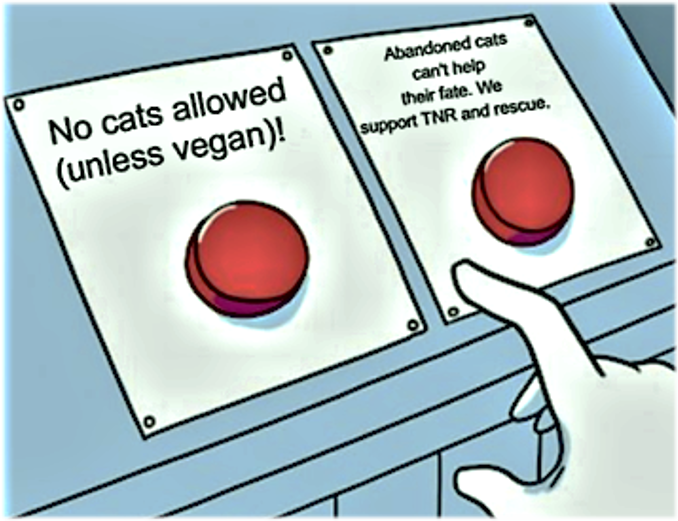Fighting for animal liberation and an end to speciesism
On the Claws of a Dilemma
Written by Lee Hall
Vegans and Cat Rescue
For a vegan, caring for a cat is no easy feat. Dogs have broader diets, so the case seems easier. Many vegans buy or make vegetarian dog food.
But how do we feed our cats? Products have been created and called vegan cat food, but are they safe?
Christina M. Gray, et al. published “Nutritional Adequacy of Two Vegan Diets for Cats” in 2004 in the Journal of American Veterinary Medical Association. The study tested two products, which proved nutritionally inadequate. The study also discussed in biological terms why cats are strict carnivores.
(The makers of the tested cat foods later vowed to improve quality control.)
Thousands of cats may be fed plant-based foods (although the product makers run into complications applying the nutritional rules), but comprehensive nutritional data attesting to safety continues to be lacking. And there’s an ethical problem in trying to make that data sufficient. Frankly, it’s testing on cats, which itself is not vegan.
We Can Apply the Vegan Principle to Our Diets, and Cats Can’t
Imagine we’re feeding a child. When asked if the vegan meals we serve are safe and nutritious, we confidently quote the Position of the American Dietetic Association and Dietitians of Canada: “Well-planned vegan and other types of vegetarian diets are appropriate for all stages of the life cycle including during pregnancy, lactation, infancy, childhood, and adolescence.”
Now, what about the animals in our homes? Shouldn’t we be able to confirm we’re ensuring appropriate nourishment for them as well?
The most current and comprehensive study of the daily dietary needs of dogs and cats is Nutrient Requirements of Dogs and Cats, National Research Council (2006), published by the National Academies Press. Here are two excerpts, from page 313:
- Dogs differ from cats in that they are not strict carnivores but fall more into the omnivorous category. This fact allows a great deal more latitude in ingredient selection and formulation. It is entirely feasible to formulate an adequate dog diet using no animal tissue-based ingredients.
- Generally speaking, strict vegetarian diets, when fed alone, are not nutritionally adequate for cats, even though such diets can be made sufficiently palatable to be readily consumedNutrient Requirements of Dogs and Cats, issued by the (U.S.) National Academy of Sciences.
What’s in Your Cat Food? Maybe That’s Not the Real Vegan Issue
Cats and dogs have been changed from wildcats and wolves. Selective breeding separated them from their potential to evolve in nature. It also made them dependent on human care. These are the unpleasant facts.
The vegan principle—and honest love—calls on us to end the selective breeding of other animals. Not to assume wildcats and wolves should be ours to have and hold, or that they must participate in a vegan ideal.
We go to great lengths for the animals we know and love, yet many people will not or cannot. That’s why dogs, cats, and other animals raised as pets are steered to shelters by the millions annually—and many don’t come out.
Furthermore, no dog or cat is vegan, as veganism is an anti-domination principle—not simply a list of allowed ingredients.
Social justice is elusive in human relations; but we strive for it. We need to also strive to be fair members of the community of life on Earth. Selective breeding and forced dependence aren’t fair, nor can they be.
What Can We Do, Then?
Let’s understand pet breeding for what it really is. Until the 1800s, keeping animals as pets was an aristocrat’s hobby. Relatively recently, it exploded into a multi-billion-dollar industry. How can vegans deal with this situation? Rather than try to make cats eat plants, we can consider:
- Talking about pets. Calling out the custom. Defending the life and freedom of undomesticated cats and dogs, including the wildcats and bobcats, the wolves and coyotes. They are the ones being erased as selective breeding becomes the norm.
- Speaking out against pet breeding—whether done through high-volume companies, local businesses, or someone’s home.
- Supporting local trap-neuter-return (TNR) groups that care for, while gradually phasing out, groups of cats outdoors.
Some will say this challenge could ultimately lead to a society without “companion” animals.
Is that so bad? I’m not asking a glib question.
Can’t we care about other animals, and derive joy from their presence on this Earth, without controlling, having and holding them? Doesn’t the feeling that we could do that make us empathetic—and vegan—in the deepest sense?
Lee Hall is a 36-year vegan, a member of the American Vegan Society’s speakers bureau, and a presenter for the North American Vegan Summerfest (July 2020, Johnstown, Pennsylvania, US). Lee has taught environmental law, immigration & refugee law, and animal law, and holds an environmental law LL.M. from Vermont Law School with a focus on climate change. Read more from Lee at the Vegan Place blog: https://veganplace.blog/
*******
Views: 564
© 2025 Created by Animal Rights Zone.
Powered by
![]()

